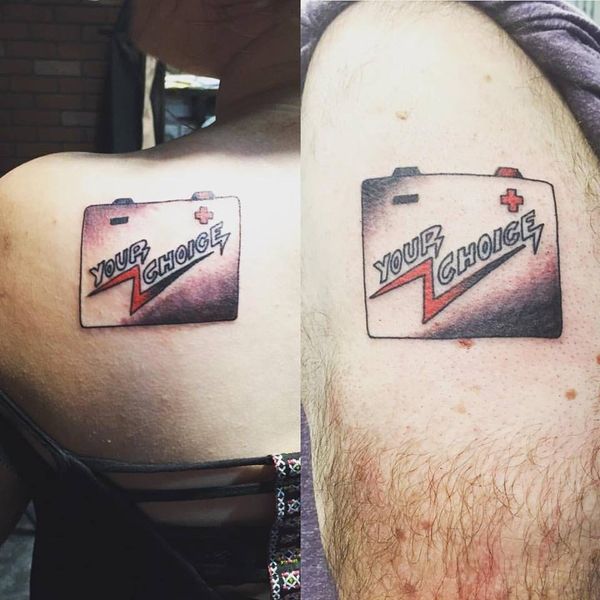My first tattoo is the sixth stanza from e.e. cummings' poem "Anyone lived in a pretty how town." It's on the right side of my ribcage, font "American Typewriter," closer to my front than to my back, and I can only really see it in the mirror. It goes "stars rain sun moon/ (and only the snow can begin to explain/ how children are apt to forget to remember/ with up so floating many bells down)." Part of it shows while I'm in a bathing suit, but, otherwise nobody really sees it, not even myself. So what's the point?
I know tattoos are a rather controversial subject, and people tend to have strong opinions of them, but regardless of all that, I've been thinking that it's interesting to consider them from a quasi-philosophical standpoint. Tattoos are an intriguing concept if you think about them. See, a tattoo is the precise, tangible intersection of an idea, which is abstract, and the body, which is concrete. Not only is it an idea that is made concrete (there are many ways, besides tattoos, to accomplish that), but is an idea made physically dynamic. That is, whatever happens, a tattoo is an idea that is bound to the flesh which is bound to be in a state of constant change and movement. Which means the idea is bound to change.
It is important to consider tattoos as a form of art. There is a such thing as bad art: there is a such thing as a bad tattoo. But there is also beautiful art and there are beautiful tattoos. Now, there is something about good art, that despite the fact that is just a impression, an impression translated through the artist's perception which is already removed from what actually is. Good art touches on some aspect of Truth or Knowledge or Being. Tattoos, which are art, then, are not only often impressions of impressions (art made translated into a tattoo), or an impression translated into another's impression (the customer's idea and the tattoo artist's work) but they are naturally intersected with the philosophical weight and the artistic weight of the human body itself and the human mind. The human mind, is that more psychology than philosophy? I don't know. A tattoo is a way of personifying almost anything, which changes the way people interact with the idea behind the tattoo which changes the way it is known, to others and to the possessor of the tattoo.
I think there are two ways you can look at tattoos (probably three, but the third is negligible for the purposes of this article). You can get a tattoo solely for aesthetic purposes, or you can get a tattoo because you have some meaning in getting the tattoo. An aesthetic tattoo is something that represents beauty for the sake of beauty. Beauty as the highest good. It has no moral meaning, it is for Beauty's sake. That's aestheticism, which throws us back to Oscar Wilde's The Picture of Dorian Gray (which is one of my favorite books) where he says "All art is at once surface and symbol. Those who go beneath the surface do so at their peril. Those who read the symbol do so at their peril. It is the spectator, and not life, that art really mirrors." Of course, that's not true, well, it's partly true, but is a perspective. A tattoo for aesthetic purposes takes this phrase and multiplies it because it's art combined with a scarred, stretched, changing body that is fully alive. It's on a canvas that bleeds when you start to mark it up. Perhaps a tattoo completely ruins aestheticism because it makes you question whether or not it is possible to make art in this way without including some whisper of the person behind it. It is on their body, after all.
Then of course, tattoos make you very conscious of permanence. And usually they make you conscious of it in a way that makes you realize that you will be stuck with this piece of art for the rest of your life (hopefully you realize that). But my tattoo artist was telling me that ten (it was either ten or three) days after you get a tattoo is probably the best time to take a picture of it, by then it has healed mostly and the color is still vibrant; after that it will start fading. Layer by layer you will shed off that permanent thing, and it will be less and less of what you intended it to be. You can get it recolored, but then, it still won't be, by virtue of the fact that actually isn't, the exact same. That idea was supposed to be permanent. And what does that mean?
There's the pain. Lasting beauty from temporary pain. Temporary pain for lasting regret. If there's no pain does it rob the tattoo (consequently the art) of depth?
Tattoos can act like your heart on your sleeve, or they can act like armor to keep people at a distance. Must they make you vulnerable? By definition? Or are they, by definition, like armor?
Tattoos bear a lot of weight. They provoke a lot of good questions, and, whatever you think of tattoos, they are certainly worth thinking about conceptually. But not too conceptually, because they are bound to the body.
I got my tattoo because I wanted to remember. I wanted to feel it throbbing every day there on my ribs because the idea was important to me. I integrated it into my very being. And it will grow and change and get bigger and get smaller and its significance will change, but it will forever (sort of) be part of me.
*Please forgive any logical errors, this was an exercise in thinking.




















